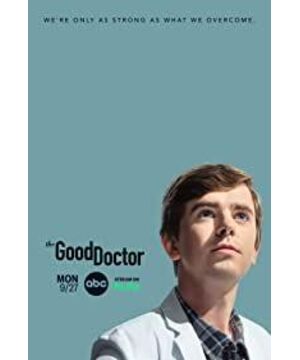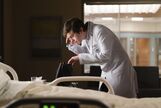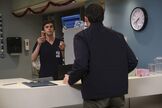I saw episode 11 of the first season and couldn't watch it anymore. The score of this film is inflated, and I feel obliged to write this truth out, so as to avoid many people like me being defrauded of precious time.
It's not a fake, but an exaggeration, because although this drama criticizes the coat of a good doctor, it is actually a film with three wrong views, and everyone is deceived by its coat.
1. Use autism as a selling point to attract attention
The film needs a bright spot, which is understandable, but combined with what I said later, this is a very disgusting publicity point.
2. What autism embodies is not the efforts of the protagonist Mo Fei, but injustice, injustice to others
In the previous 11 episodes, only the first episode reflects the speciality of the protagonist, and the other 10 episodes are just as storytellers and storytellers, doing inexplicable things in each episode, and then let others come. Pity him, forgive him.
He was late almost every day, and he was absent from work in episode 11. The dean still protected him. Is this fair to other employees who work diligently?
Could it be a whole episode of Skittles in this episode.
In the seventh episode, the dean threatened the patient's parents not to let Mo Fei see a doctor and get out. Is this fair to the patient, who doesn't even have the right to choose a doctor?
3. Autism without any effort
Congenital deficiencies can be made up for the day after tomorrow, but until the end of episode 11, the protagonist is a surgical intern, and there is no clip that reflects his hard study, love of medicine, and the spirit of making up for congenital deficiencies.
The so-called Scholar Syndrome is only mentioned by the dean, but it is not reflected anywhere. It stands to reason that such a character design should not be studied in medical books every day, overcome various intractable diseases, and answer questions that others do not understand like a living dictionary? But the only thing he does is to occasionally say a word when other doctors are operating, and make a narration.
Mo Fei's brother fell to his death when he was a child, so he embarked on the path of studying medicine. The background of this story is only used to express emotions, and he misses his brother at every turn. In the fifth episode, I met a child with osteosarcoma who looks very similar to his brother. Well, half of the episode is full of memories. When other doctors are working hard, what are they doing is doubting the diagnosis and putting the unknown. Hope to tell his parents that the rest of the time is spent chatting with the kid.
In this case, shouldn't he be desperate to study osteosarcoma therapy with the special nature of savant syndrome? Even if it doesn't work out, it shows his love for his brother and medicine, rather than chatting and chatting about doing nothing until the end of the episode.
4. Superficial plot
The core of the whole film is lyricism, lyricism regardless of facts, so what you see are all kinds of short stories, stories of doctors, stories of patients, stories of couples, stories of managers, really involving medicine and hospitals. There is very little content, and a large part of it is still made up.
A black doctor can spend two days with a patient, just sit and chat with him, regardless of other work. Could it be that the protagonist can chat with various patients. His daily job is basically to chat, who he wants to chat with, and how long he wants to chat. Hospital work in the US is really easy.
The patient's kidneys are removed as soon as they say they are removed. There is no need to discuss with the patient and family members. After the operation, the patient will be told to the patient who is awake: Thank you, thank you.
Hospitals in the United States may not distinguish between extra-brain and thoracic departments, and surgeons are all-rounders who can perform any operation, from the head to the toes.
The doctor can make an appointment with the patient directly, without telling the patient what items he has to do and how much the patient does not want to know.
The patient has never had any doubts about the doctor's treatment, and does not care about any cost. No matter whether the operation is successful or unsuccessful, they are all grateful to the doctor and have high quality.
There are a lot of similar bugs, and there are so many in each episode, so many are annoying.
Summarize:
This drama is actually a bad movie. The reason for the high rating may be because many people were deceived by the first episode. The first episode was really good and gave you a lot of expectations, but the plot behind it is very bad.
Take my word for it, don't waste your time on it.
View more about The Good Doctor reviews











